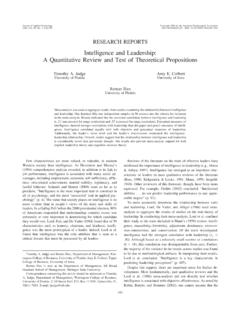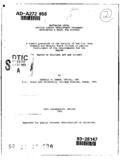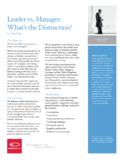Transcription of Arrest of Vessels: Practical Considerations …
1 G. Robert Toney, President 1 Arrest of vessels : Practical Considerations introduction National Maritime Services and National Liquidators combine the experience of the global leader in the management of judicial and non-judicial vessel foreclosures and the world s largest seller of distressed commercial ships and pleasure yachts. National Maritime Services manages assignments of Arrest cases against cargo ships, tankers, passenger vessels, support vessels, pleasure yachts, and other vessels around the world.
2 The company performs its services on behalf of lien claimants, vessel lenders, and their counsel, offering a full-service commercial vessel program for arrested vessels, and the subsequent period of custody, on complicated matters throughout the world. National Liquidators is known for its work relating to the repossession and auction of pleasure vessels throughout the United States, Caribbean, Canada and Central America. The combined companies manage in excess of 2,000 assignments annually, having handled over 24,000 cases since their inception in 1988.
3 National Maritime and National Liquidators also hold various government contracts, with agencies such as US Department of Justice and General Services Administration (GSA), relating to the seizure, storage and sale of vessels which result from criminal or government forfeiture. National Liquidators operates , a well-known vessel auction web site which receives millions of monthly visits from sales prospects located around the world. Placement of boat, yacht and ship listings on this site is reserved exclusively for clients of National Maritime Services or National Liquidators.
4 Further information on these corporate services can be accessed on the or websites. The companies also offer similar services for commercial and general aviation aircraft located in the United States. G. Robert Toney is Chairman of Toney Capital Holdings, which operates both National Liquidators and National Maritime Services. Other affiliated companies include Maritime Capital Group, a marine lending operation, MariTech Services, a marine repair company, and National Yacht Sales, which specializes in yacht and ship brokerage.
5 Mr. Toney also holds ownership interests in ST Liberty, LLC, which acquires high risk transactions secured by marine collateral, , an internet-based used automotive dealership, and Paradise Bank, a south Florida-based bank, where he serves as a Director. When to foreclose a mortgage through Arrest During good economic times, commercial ship lenders don t hesitate to Arrest vessels when a particular ship owner is in default under the ship mortgage. Under these circumstances, the general feeling is that one could easily foreclose a mortgage, in almost any jurisdiction in the world, await the court sale, and watch multiple bidders run up the price to a point that covered most claims and the associated costs of Arrest .
6 In recent years the shipping market has changed, a result of weakened global economic conditions; so too has the expectations associated with vessel arrests. Demand for ocean-going cargo and corresponding rates have plummeted, reducing the value of cargo ships and creating a glut of commercial vessels. Additionally, many new builds are scheduled to enter the market over the next few years. The reduced collateral G. Robert Toney, President 2 values, when paired with the costs of custodianship and other charges incurred during the Arrest period and subsequent sale, have forced budget-conscious lenders and other claimants to pause and consider their options prior to ordering a commercial ship Arrest .
7 The primary concern becomes, will it cost more to Arrest than what the sale of the ship will return, or are there other options that might make more economic sense? Is the claimant at risk that the arrested vessel will not sell to a third party at auction, and the claimant may end up owning the ship, expending additional resources that may exceed the proceeds that a future sale of the vessel will ultimately generate?1 Despite these concerns, financial institutions cannot sit back and watch their assets deteriorate while borrowers are not performing according to the terms of their loans.
8 Inaction is a poor business practice for a financial institution/lender, as an action against the vessel is often the best, if not only potential avenue for recovery of the debt. Also, in today s regulatory environment, there is generally is more pressure from regulators to write down non-performing loans, forcing institutions to react more quickly. Despite the previous contradictions, many vessel arrests are effectively managed, resulting in positive recoveries for lenders or other claimants. The important thing is to move cautiously and carefully, yet without unnecessary delay.
9 Issues to consider when evaluating a potential Arrest The amount of the claim (or mortgage). A key consideration for the claimant (or lender) is whether the amount of the outstanding claim (loan) makes an Arrest economically feasible. The simple fact that a legal right exists doesn t necessarily mean that its exercise makes good business sense. Putting aside attorney fees and other expenses, the cost of holding a ship in an active port during the pendency of legal proceedings can be upwards of $10,000 US daily.
10 As a general rule, arrests of commercial vessels are not an economically-viable option if the outstanding claim are less than $100,000 US. Ship mortgages and considering other recorded liens against the vessel . The holder of a preferred mortgage should order an updated Abstract of Title or Transcript of Registry to ensure that their interests are properly perfected and to identify other potential liens that may be recorded against the vessel s title. If another maritime lien against the vessel is likely, consider the equity position of the claim in relation to the mortgage.





